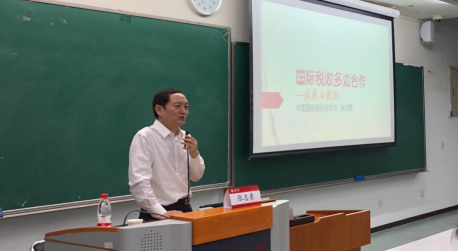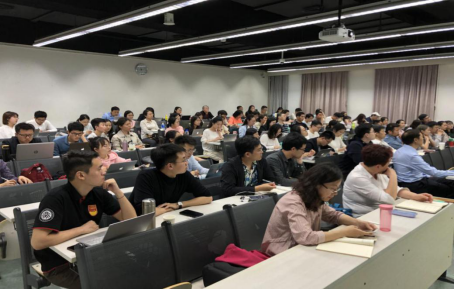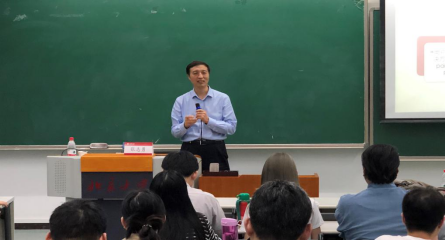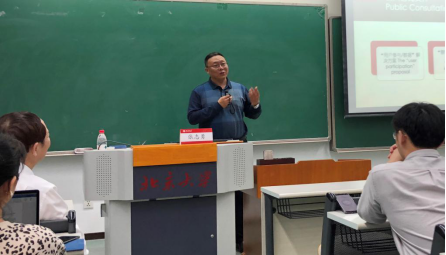The 15th lecture of Peking University Economic Law Forum was successfully held
Date:2019-05-14
On April 23, 2019, from 18: 30 to 21: 15, the 15th academic lecture of the Peking University Economic Law Forum, "Multilateral International Tax Cooperation-Achievements and Challenges", was successfully held at Peking University Law School. This lecture was presided over by Ye Shan, professor of Peking University Law School and delivered by Zhang Zhiyong, President of china international taxation research institute and former deputy director of the State Administration of Taxation. Professor Zhang Shouwen, director of the Institute of Economic Law of Peking University, and Associate Professor Zhang Zhiyong, director of the World Trade Organization Legal Research Center of Peking University, were invited as guest reviewers for this lecture. The lecture attracted a large number of undergraduate students, master's and doctoral students majoring in financial and tax law and international tax law, as well as students from other disciplines from Peking University Law School.

(President Zhang Zhiyong is giving a speech)

(many students attend the lecture)
President Zhang Zhiyong takes the achievements and challenges of multilateral international tax practice as the main line, and makes a theoretical analysis combining how to construct the international tax system in the post-BEPS era, the establishment of the "the belt and road initiative" tax cooperation mechanism and the multilateral cooperation solutions for the digital economy. First of all, President Zhang introduced the current situation of multilateral cooperation in international taxation from a macro perspective, and elaborated the development process of BEPS action plan in detail. Later, President Zhang said that in the process of forming the international multilateral tax cooperation mechanism, China can establish an international tax system suitable for China's tax practice through "the belt and road initiative" tax cooperation. At the same time, President Zhang pointed out that the digital economy is an international tax problem that has not yet been solved. He believes that the problem of digital economy is essentially the problem of economic digitalization. The connection degree, data and qualitative problems in the digital economy all need to explore solutions on the understanding of this essence. Finally, President Zhang stressed that multilateralism and multilateral cooperation have become the mainstream of international tax development. While actively performing its multilateral cooperation duties and playing its role, China has also taken this opportunity to continuously promote the modernization of China's tax system and tax collection and management system.

(summary by teacher Zhang Shouwen)

(summary by teacher Zhang Zhiyong)
After that, Zhang Shouwen and Zhang Zhiyong gave a brilliant summary of the lecture. Teacher Zhang Shouwen pointed out that President Zhang condensed the core content of the international taxation field in this lecture. For example, the lecture mentioned many times that the international tax system needs coordination and balances with each other; behind the discussion about the ability of international tax collection and management In fact, it is a reflection on the relationship between the state and taxpayers; cooperation in the field of international taxation is not limited to cooperation between sovereign states, but also between taxation agencies and taxpayers; the essence of national tax competition is the need for the tax system to be inclusive and deterministic. Teacher Zhang Zhiyong believes that President Zhang has always maintained a high-rise and research-style research pattern for the international taxation system. The role of "soft law" in the international tax system should also be taken seriously. The reasons behind the international tax system from bilateral agreements to multilateral agreements are still worth exploring. We need to look at the local tax law practice more objectively, and extract the tax practice experience including “Chinese wisdom”, and hope that students can provide more diversified solutions for China's international tax system construction in the future. In the interactive question and answer session, the students closely followed the theme and actively asked questions. President Zhang answered the questions of the students in detail and the discussion atmosphere was warm. This lecture has helped students to develop relevant knowledge in the field of international taxation and benefited a lot.
Translated by: He Lindan
Edited by: Xie Zhao



